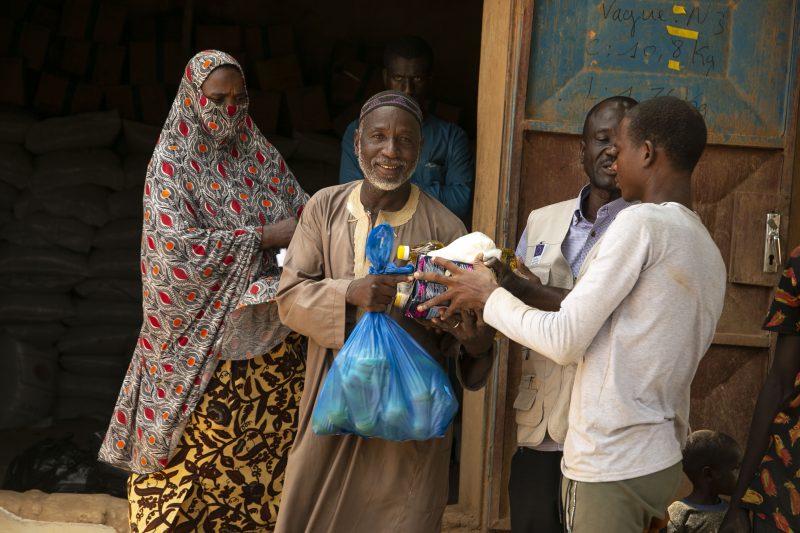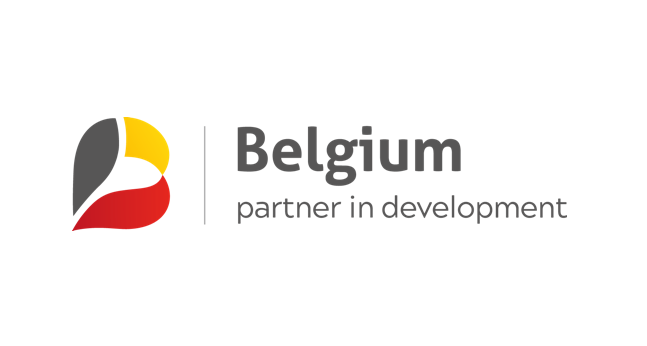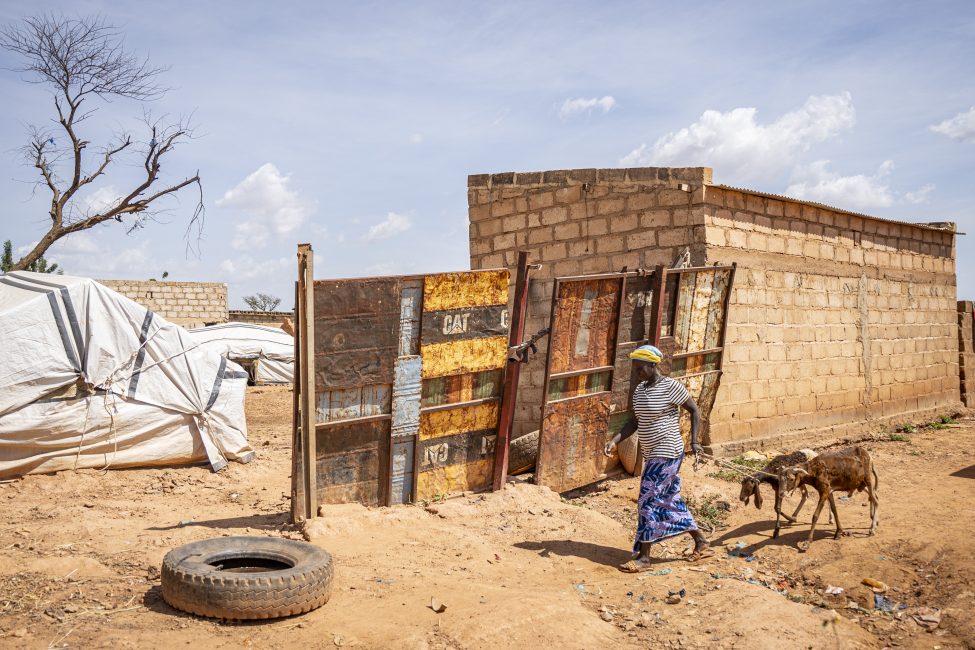In the Sahel and Great Lakes regions, livestock keeping is more than an economic activity for rural families: it is a lifeline. For them, a healthy goat means milk for their children, and a chicken represents the chance of a better life. But climate catastrophes, animal diseases and armed conflicts are putting pressure on these vulnerable communities increasingly often. What do you do if you lose your livestock from one day to the next? What if your only source of income disappears? That is the harsh reality facing millions of people. Our humanitarian support for livestock keepers protects their livelihoods from disaster and uncertainty.
Here at Vétérinaires Sans Frontières Belgium, we believe in the power of livestock keeping as a tool to improve the food security of these communities. That is why we are committed to three important principles: humanitarian aid, development and peace. These principles allow us to offer direct support in times of crisis: we provide food for families, protect their animals and help families rebuild their lives. We also invest in structural solutions, such as better access to markets and sustainable livestock keeping, so that these people are strengthened in the long term. To promote peace, we also support dialogue and cooperation, both between livestock keepers and agricultural farmers and between displaced persons and host communities.
This has been our aim since November 2023 in Burkina Faso, Niger, the DR Congo and Uganda, with support from the Belgian government. Our experience and close cooperation with local partners have enabled us to make progress in all these areas. We would like to share some of our inspiring results below.
Emergency aid for vulnerable households

Vétérinaires Sans Frontières Belgium distributed food packages to 260 households in Niger. © 2SCOM
Armed conflicts force many families to leave their homes and seek refuge in safe areas, often near urban centres. These forced displacements put both displaced people and local families in extremely vulnerable positions. To help them, we offer support with their essential basic needs, such as food and other vital resources.
- In Niger we gave food packages to 260 households. We also assisted 123 women – the victims of violence – with the development of an economic activity, so that they could regain control of their future.
- In the DR Congo, we distributed yogurt to 300 undernourished children and gave financial support to 400 vulnerable households.
Assuring the right to a dignified life and a better future

Two Congolese women receive three of the 400 goats distributed by Vétérinaires Sans Frontières Belgium.
For livestock keepers in these regions, their animals are their security. A sick cow or dead chicken means less food and a lower income. That’s why preventative care and access to veterinary services make a world of difference. We also meet other needs experienced by displaced people, such as basic infrastructure and income-generating activities.
- In the Karamoja region of Uganda, we vaccinated 240,000 animals against deadly diseases. We also repaired fourteen wells, giving people access to clean drinking water. Soon another ten wells will be created.
- In the DR Congo, we protected almost 10,000 goats from ovine rinderpest and 4,633 chickens from virulent Newcastle disease. We also distributed 400 goats among 260 households in South Kivu province.
- In Burkina Faso, we provided livestock keepers with seeds, fertilisers and agricultural tools, as well as training them in more sustainable agriculture and in taking the future into their own hands. For example, we taught 50 women how to produce and sell improved stoves and ecological charcoal. As well as helping to make the world around them more sustainable, this protects the women from the dangers of collecting firewood.
-

In Burking Faso, Vétérinaires Sans Frontières Belgium taught 50 women to produce improved stoves and ecological charcoal. ©Semfilms
Stimulating social cohesion, reconciliation and peaceful coexistence

Cohesion in Uganda by organising inter-ethnic dialogues. © Tim Dirven
When armed conflicts flare up and ethnic differences are magnified, social cohesion threatens to shatter. But dialogue can close the gap. By committing to inter-ethnic conversations and cooperation, we help communities live together in peace.
- In Uganda, we organised inter-ethnic dialogues that have improved the general safety situation, and we trained eight groups in trauma processing.
- In the DR Congo, we set up twelve humanitarian monitoring committees. These committees monitor humanitarian situations and offer protection to vulnerable population groups.
Strengthening prevention, preparedness and response capacity
We don’t only want to help when need is greatest: we would prefer to prevent the devastating impact of disasters as well. That is why we invest in long-term solutions and structural improvements.
-
In Niger, we have taken preventative measures against bush fires. For example, we have created 140 km of fire corridors and set up fire awareness campaigns involving 408 people.

In Niger, Vétérinaires Sans Frontières Belgium has created 140 km of fire corridors to prevent wildfires.
- In the DR Congo, we have trained 28 humanitarian partners in the LEGS method (Livestock Emergency Guidelines and Standards), an international guideline for livestock management in crisis situations. Animal diseases are not only a threat to herds and the livelihoods of families, but also to public health – especially zoonoses, diseases that can be transmitted from animals to humans. Thanks to this training, we and our partners can react faster and more effectively to health crises in animals.
Offering help fast in crisis situations

A VSF colleague distributes essentials to the victims of a devastating fire in Uganda.
When disaster strikes, time is of the essence. Unfortunately, these disasters are happening more and more often in the unstable regions where we work, and often at unpredictable times. Thanks to our special emergency fund, we were always able to react fast and offer help to those that needed it.
- In the Tahoua region of Niger, 872 livestock keepers lost their animals as a result of severe flooding. We supported them with food packages and financial help.
- In the DR Congo, we reacted fast to the mpox outbreak with medical kits and veterinary assistance, and we confirmed cases of Rift Valley Fever.
- In Uganda, we helped 62 families after a devastating fire with emergency aid, financial support and temporary accommodation.
Headwinds and progress
Implementing our activities hasn’t been without its problems. Inflation made aid work more difficult in Uganda and the DR Congo, and the security situation in South Kivu has deteriorated considerably. Climate change – which leads to extreme droughts, forest fires and floods – is also confronting us with immense challenges and forcing us to adapt constantly.
Nevertheless, we have continued our work unabated. In 2025, we will go on working to protect people, their food security, the restoration of sources of income and access to essential services. We also want to extend our crisis response, with specific attention to emergency situations in animal health, climate catastrophes and conflicts in the affected regions.
We are continuing to commit to families who depend on their livestock. To children who want to grow up healthy. To a future in which people don’t have to lose their only source of income to crisis or conflict. Because as long as people are fighting for their future, we will fight with them.


